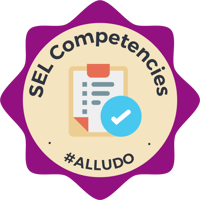6 min read
7 Ways Social Emotional Learning Can Support Teachers in Your District
Damon Torgerson : Apr 9, 2022 5:00:00 PM
/7%20Ways%20Social%20Emotional%20Learning%20Can%20Support%20Teachers%20in%20Your%20District%20(1).jpg)
Connecting with students and helping them learn is about far more than academics. Each student in a classroom is an individual with emotions and navigating them can be just as challenging as learning long division. Teachers must learn to cope with their own emotions, so they can help students navigate theirs.
At Alludo, we partner with school districts across the country to create dynamic online PD programs for teachers and administrators. That includes courses about social emotional learning, which is essential because it can help teachers to better understand their students, creating a positive school climate.
Here’s what you need to know about social emotional learning and seven ways that social emotional learning can support teachers in your district.
Table of Contents
- What is Social Emotional Learning?
- What Are Examples of Social Emotional Learning?
- 7 Ways SEL Supports Teachers
- Alludo's Take
What is Social Emotional Learning?
Social emotional learning is a teaching methodology that encourages teachers and students to learn about their emotions, especially to be able to express those emotions fully while still being empathetic to others and building social awareness.
Kids of any age may struggle to manage their emotions and may lash out at teachers or fellow students when they feel frustrated or overwhelmed. Likewise, teachers may struggle with overwhelm and that can lead to less-than-ideal classroom performance. With social and emotional learning, any teacher can create a positive and affirming learning environment while still giving their students a safe outlet for their emotions.
What Are the SEL Competencies?
There are five core SEL competencies that when put together, give a teacher the tools they need to build positive relationships with their students and give students the support they need to foster good mental health and engage in appropriate social behavior.
#1 Self-Awareness
The first SEL competency is self-awareness, which teaches students how to recognize their own emotions and the impact they have on their behavior and relationships. It also helps teachers recognize their strengths and weaknesses, so they can understand what they can do to improve their performance.
#2 Self-Management
Self-management occurs when students and teachers acknowledge their emotions and take ownership of their responsibility for them. It also encourages people to set and work toward goals to help them do a better job of managing their feelings and interacting with others.
#3 Social Awareness
Social awareness is the ability to put oneself in another person’s shoes, whether they’re from a different culture, speak a different language, or have unique challenges that require understanding and accommodation. SEL training shows teachers (and by extension, their students) to act with empathy and behave ethically whether they’re at school, at home, or in the community.
#4 Relationship Skills
Relationship skills are necessary to create and maintain positive and healthy relationships with the people around them, including those from a diverse range of backgrounds and cultures. The focus of this competency is on two-way communication, conflict resolution, and knowing how and when to offer or request help.
#5 Responsible Decision-Making
The final competency of SEL instruction involves teaching how to respond to a variety of situations based on the behaviors they have learned. These include safety and the well-being of the self and others, ethics, and weighing the consequences of a decision.
/AL_07-Blog02-2.jpeg?width=450&name=AL_07-Blog02-2.jpeg)
What Are Examples of Social Emotional Learning?
Before we reveal the ways that social emotional learning can support teachers, here are some examples of SEL in the classroom that can help to build the five core competencies in students:
- Start the day with an emotional check-in. When students arrive for the day, teachers can ask them to explain how they’re feeling. With young children or kids who aren’t neurotypical, there may be a need to provide an emotion chart to help kids identify which emotions they’re experiencing.
- Have kids write in a journal. Journal-keeping encourages kids to express themselves. Free writing time can be a break from regular classroom activities and give students a chance to re-center themselves.
- Assign partnered & group activities. Teachers can alternate between strategic partnerships and groups designed to help kids work with one another and self-directed activities where they choose a partner or group.
- Have students engage in role playing activities. Role playing is extremely useful because it encourages students to put themselves in another person’s shoes and imagine what they might experience.
- Work on conflict resolution with peer mediation. As adults, we all need to manage conflicts. When students learn about conflict resolution and accept mediation from their peers, they learn a lot about themselves and others.
Teacher support in any of these activities is a must as kids put their SEL skills to the test.
7 Ways SEL Supports Teachers
All teachers need support and professional development can and should play a role in providing that support. While there are many ways to support teachers in their work, one of the most important is by providing SEL training. Here are seven ways that SEL supports teachers.
#1: It Enhances Relationships Between Students and Teachers
The student/teacher relationship is at the heart of learning. When teachers learn SEL skills, it helps make them more aware of their own emotions as well as the emotions of their students, something that’s crucial for building and sustaining healthy relationships.
SEL promotes empathy and kindness, both of which can help in the formation of positive relationships with students as well as with peers. Said another way, SEL training for teachers builds emotional intelligence which can impact every aspect of a teacher’s relationship with their students.
#2: It Leads to Better Student Outcomes
A lack of understanding between a teacher and a student can contribute to less-than-ideal student outcomes. Students perform their best when they feel nurtured and supported, and SEL can help teachers be more empathetic and understanding of their students’ struggles and emotions.
Because SEL meets students where they are emotionally and keeps teachers on-track emotionally, too, it’s an ideal tool for providing students with the learning environment they need to do their best.
#3: It Creates a Supportive Environment
Strong, functional relationships are an essential component of good mental health for both kids and adults. SEL training for teachers improves teachers’ social awareness and increases the likelihood that they’ll collaborate and bond with their peers, both of which can lead to teachers feeling supported and valued.
At the same time, SEL training can help teachers create a supportive environment for their students. By giving teachers the support they need, SEL gives them the bandwidth to pay it forward to their students in the classroom, so everybody feels supported.
#4: It Makes Teachers More Effective
A teacher who hasn’t cultivated their own social emotional skills is likely to struggle with teaching students to manage their emotions. When teachers receive SEL training as part of their professional learning, they gain the tools and self-knowledge they need to practice SEL in the classroom.
A teacher who models strong emotional self-awareness and empathy to their students is always going to be more effective than one who does not. SEL training turns teachers into good role models, enabling them to connect with their students and help them learn how to behave in any situation.
/AL_07-Blog02-3.jpeg?width=450&name=AL_07-Blog02-3.jpeg)
#5: It Improves Teachers’ Self-Care
A big part of emotional awareness is self-care. Teachers may sometimes neglect their own emotional and mental well-being because they are focused on their students. Districts that include SEL courses as part of teacher professional development reap the benefits.
Teachers who are emotionally aware and centered are more likely to recognize the signs of overwhelm and when they need a break. They know when they need support and when they’ve reached their limits and have the tools to take care of themselves, which leads to them taking better care of students.
#6: It Makes Teachers’ Work More Rewarding
When a teacher is overwhelmed, exhausted, and unsupported, they’re likely to show how they’re feeling in an unhelpful way that may be detrimental both to themselves and their students. On the other hand, teachers who prioritize self-care and manage their own emotions well are likely to be highly effective in the classroom.
Teachers who receive support in the form of SEL training are engaged with their students and energized by the positive results they see. They’re prepared to help students who are struggling and to feel good about doing so.
#7: It Helps to Prevent Teacher Burnout & Turnover
One of the biggest issues facing school districts around the country is teacher burnout and turnover. There’s an ongoing and worsening teacher shortage in the United States and social and emotional learning can play an important role in addressing the issue.
Teachers who feel emotionally supported and have SEL skills they can use in the classroom are less likely to burn out and as a result, less likely to leave their jobs. Every school district should consider SEL training as part of their professional development because it can increase teacher retention.
Alludo’s Take
The reasons we’ve listed above illustrate why SEL content is an essential part of the Alludo Content Catalog. The courses we have curated include core SEL competencies, self-care, wellness, good health practices, and boundary setting for teachers:
- Our robust platform makes it easy for school districts to incorporate SEL into professional development.
- Gamification encourages teacher participation in PD, providing them with tangible rewards in exchange for their work.
- Our online learning environments foster teacher collaboration with a healthy dose of competition.
- SEL training makes teachers feel supported and valued.
- Student experiences improve and are supported by SEL training.
 |
 |
 |
With Alludo, school districts can lay out requirements for SEL training while also giving teachers a choice and a voice in what they learn. The result is increased teacher satisfaction, reduced teacher turnover, and better student outcomes.
/AL_07-Blog02-4.jpeg?width=450&name=AL_07-Blog02-4.jpeg)
Support Teachers in Your District with SEL
Providing SEL training to teachers in your district will ensure that they feel supported in their work and have the tools they need to build healthy relationships with students, model empathetic and socially acceptable behavior, and enjoy their time in the classroom.
Want to reach up to 100% PD in your district? See how Alludo can help make it happen with our free professional development platform trial, including:
- Hundreds of core topics
- Asynchronous microlearning activities
- Timely and specific feedback
- Analytics that show learning impact
- Access anytime, anywhere
Earn Continuing Education Units in Alludo!
Earn Continuing Education Units from Fresno Pacific University!


